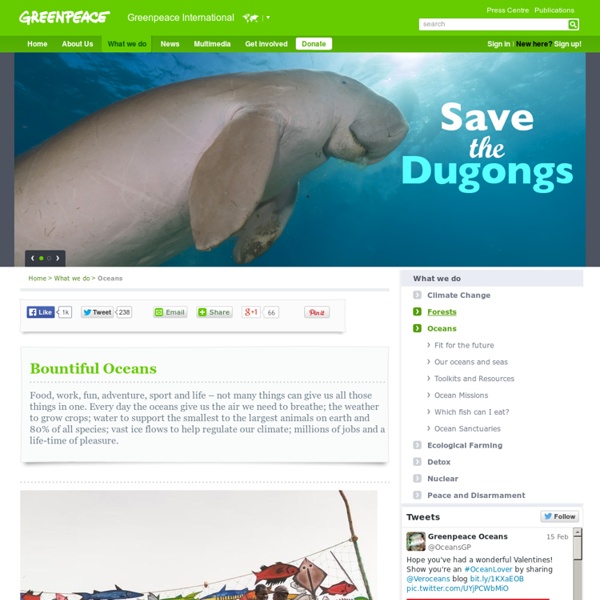Greenpeace: Oceans
Food, work, fun, adventure, sport and life – not many things can give us all those things in one. Every day the oceans give us the air we need to breathe; the weather to grow crops; water to support the smallest to the largest animals on earth and 80% of all species; vast ice flows to help regulate our climate; millions of jobs and a life-time of pleasure. Send us your favourite ocean image and it could be featured here! You and I are alive right now because of the oceans. They are home to the largest animal our planet has ever known – the now-endangered blue whale - but there are still huge areas of ocean that humans have never seen. Earth's longest mountain range is not on land but under the sea - the Mid-Oceanic ridge system, which winds around the globe from the Arctic Ocean to the Atlantic. More people have stood on the moon than dived the deepest ocean trench and less than 5% of all the oceans have been explored. We can do it. The oceans support billions of us.
National Geographic: The Ocean
International Maritime Organization
15/04/2014 IMO Secretary-General Sekimizu chaired the judging panel for the Seatrade Awards 2014 (14 April). The ceremony included an award in support of IMO's theme for World Maritime Day 2014 ‘IMO Conventions: Effective Implementation’, won by the International Association of Classification Societies (IACS). IACS Chairman Mr R. Cazzulo received the award from Her Royal Highness The Princess Royal; Mr Sekimizu; and sponsor Mr Hui, Managing Director, China Classification Society. 14/04/2014 IMO’s Beatrice Vormawah, Head, Technical Cooperation Implementation Coordination Section, represented IMO at the Ghana Maritime Authority’s three-day sub-regional seminar on ship routeing and safety in navigation, Accra (7-10 April), for participants drawn from eight countries in West and Central Africa. More...
State of the Ocean.org
SAS
All The Sea
Sea Shepherd
Seaspout
Encyclopedia of Earth
Blogs
SSA Marine has been quietly moving along and has made significant strides at Long Beach Commercial shipping supremo says the West Coast must look at wider horizons Initially, such inspections were done on an ad hoc basis A look at the heartland, Great Lakes, the Seaway and inland infrastructure, too. It’s good news, bad news and a time for head scratching, too. LNG is the hot topic of the year, and will be a major focus of the 2013 SHIPPINGInsight Conference in October. Determining causes and circumstances of marine accidents in order to raise the quality of seafaring The Board of Steamboat Inspectors gets involved The GreenPort conference is likely to have a lasting impact on the Indian maritime scene. An avoidable and tragic grounding that led to safety improvements Often tenders called by major ports have conditions that weigh heavily on the bidder The only way Hong Kong is going to get all port users to burn cleaner fuel while in port is to make it a regulatory requirement.
European Maritime Safety Agency (EMSA) - Quality Shipping, Safer Seas, Cleaner Oceans
Related:
Related:



